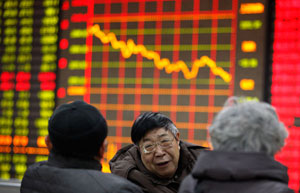Mainland, HK unveil cross-border trading plan for stocks
Updated: 2014-04-11 01:08
By XIE YU in Shanghai (China Daily)
|
||||||||
Shanghai seeks new board for innovative industries
Lu Wenjie, an H-share strategist at UBS Securities, said the pilot program will also help buoy up mainland stocks.
Regardless of the bad performance of the mainland's A-share market over the past few years, there are still some "good-quality" stocks attractive to offshore investors, he said.
"Some consumption and machinery stocks are only available in the A-share market, and I believe their value will draw the attention of foreign investors," Lu said.
|
 |
|
 |
The benchmark Shanghai Composite Index surged by 1.38 percent to 2134.3 at its close on Thursday, with brokerages leading the rally.
The gauge index that traces brokerage companies soared by 6.7 percent. China CITIC Securities, the nation's biggest brokerage in market value, grew 9.74 percent.
In Hong Kong, the Hang Seng Index jumped 1.5 percent, hitting its highest close since Jan 2. CITIC Securities gained 9.2 percent and Haitong Securities rose by 7.5 percent.
"It is for sure good news for securities companies, as commission income is to expand largely with the new rule facilitating cross-border stock trading," Rui said.
Li Fei, an independent financial commentator, said the pilot scheme will create new investment channels for the renminbi, helping internationalize the currency.
It will also consolidate Hong Kong's position as an offshore renminbi center, he said.
Jiang Shu, a foreign exchange analyst at Industrial Bank in Shanghai, echoed the view.
"This is a step in China's gradual liberalization of its capital account," he told AFP.
"The authorities will definitely pay close attention to the capital flows between Shanghai and Hong Kong and introduce supportive regulatory measures."
Currently, overseas investors can invest in Shanghai and Shenzhen only through a qualified foreign institutional investors program, or QFII, that grants quotas for A-share investment.
QFII quotas had reached $53.4 billion, and the RQFII quota — which allows foreign institutional investors to use the renminbi to invest in the mainland rather than the US dollar — had reached 200.5 billion yuan by the end of March, according to the State Administration of Foreign Exchange.
Agencies contributed to this story
 |
 |
| China's CSI300 index in biggest loss in 7 months |
- China regulates preferred stocks information disclosure
- Chinese shares 'too cheap to ignore': HSBC
- China stocks close higher on Thursday
- China announces Shanghai-HK mutual stock market access
- Shanghai stocks ride on strong financials
- Index up as cyclical, financial stocks soar
- Empirical Research of Stock Option
- Research Report on Regulation and Policies of Stock Option Motivation System

 Hagel gets recipe of goodwill
Hagel gets recipe of goodwill
 US, China firms team up on green truck play
US, China firms team up on green truck play
 21 injured in Pennsylvania school
21 injured in Pennsylvania school
 Bakers perform with dough in pizza championships
Bakers perform with dough in pizza championships
 People enjoy cherry blossoms in Washington
People enjoy cherry blossoms in Washington
 Top 10 China archeological discoveries for 2013
Top 10 China archeological discoveries for 2013
 Mummy & me in New Zealand
Mummy & me in New Zealand
 Chinese schools vie in moot court
Chinese schools vie in moot court
Most Viewed
Editor's Picks

|

|

|

|

|

|
Today's Top News
Sebelius resigns after Obamacare woes
US Asian carp find plates in China
Soybean talks focus on biotech issues
US, China firms team up on green truck play
Ships sale to Taiwan 'unlikely'
Hagel gets closer to PLA
DerbySoft gets VC funds
21 injured in Pennsylvania school
US Weekly

|

|








